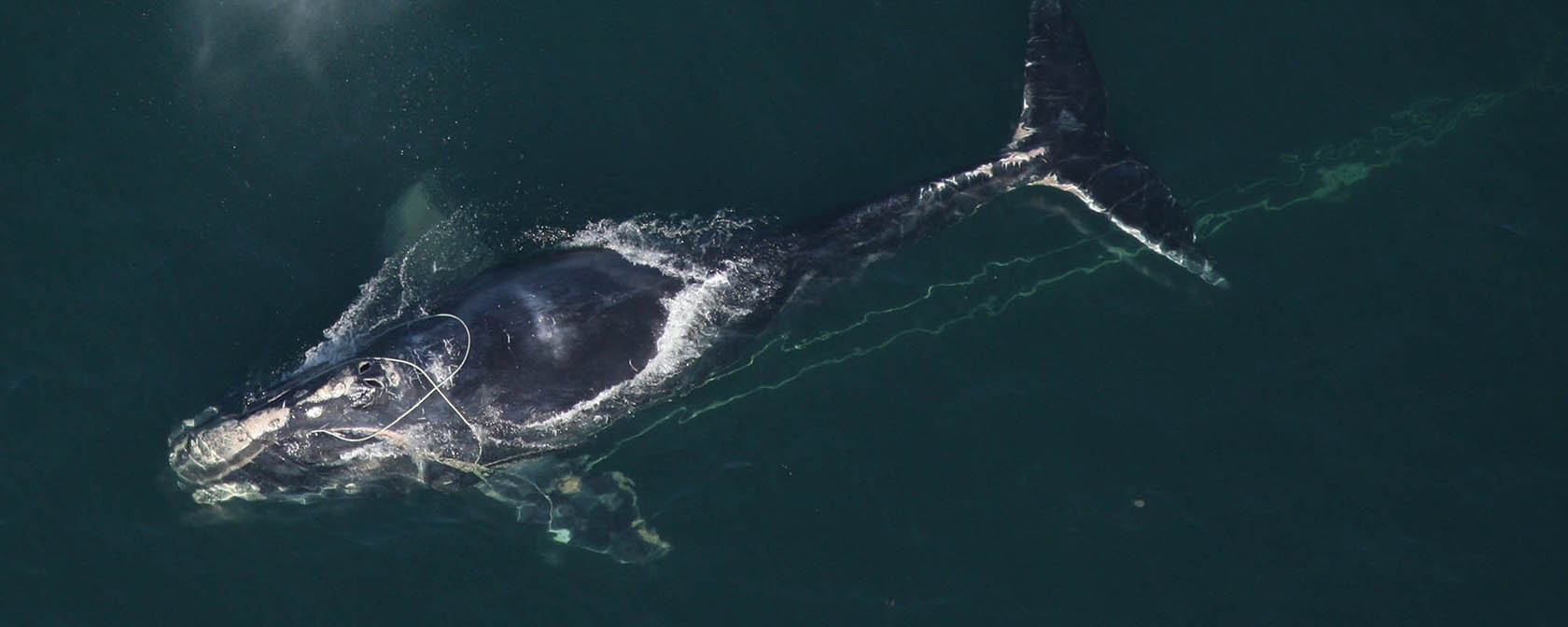By Sara Amundson and Kitty Block
In late June, the body of a dead North Atlantic right whale calf was found floating off the coast of New Jersey—a victim of two boat strikes, according to a preliminary analysis by the National Oceanic and Atmospheric Administration. While this would have been a sad story no matter what animal was involved, it is particularly concerning that this was a young right whale with many reproductive years ahead of him. There are just 400 of these mammals surviving in our oceans, and the death of even one could have deadly ramifications for the entire species.
Yesterday, the International Union for Conservation of Nature escalated the urgency around saving right whales by uplisting their status on its red list from “endangered” to “critically endangered” – meaning that these animals are now just a step away from extinction.
The numbers are indeed alarming. Since 2017, only 22 North Atlantic right whale calves have been born. At the same time, 31 North Atlantic right whales have died and an additional 10 have been presumed dead due to the serious nature of injuries they’d sustained, bringing the total to 41 dead right whales in the past three years.
This plight of North Atlantic right whales is entirely attributable to human actions. These native American marine mammals make their home along the eastern shores of the United States and Canada, and the reason their numbers went down in the first place is because they were easy targets for whale hunters for centuries. These mammoth animals are slow-moving and live close to the coast, which made them the “right” whales to hunt.
While whaling is now banned in U.S. and Canadian waters, it has been replaced by new threats. As the IUCN said in its release announcing the uplisting, entanglement in fishing gear and vessel strikes are largely to blame for the decline in right whale populations, as is climate change, which pushes the whales’ main prey species further north during summer where they are more exposed to accidental encounters with ships and are also at high risk of entanglement in fishing gear.
The Humane Society family of organizations has been sounding the clarion call to these countries for many years now on saving right whales. We’ve taken the fight to court, and in April we won a lawsuit in federal court, brought along with our coalition partners, that challenged the U.S. government’s failure to protect right whales from deadly entanglements in fishing gear. In 2013, as the result of a legal petition we filed, the United States mandated that large ships slow down while passing through key right whale habitats. This resulted in reducing deaths from lethal ship strikes, which until recently was the leading cause of death for the species. We also successfully petitioned to expand their designated critical habitat protections in key feeding areas and in the Southeastern United States where female right whales birth their young.
The Humane Society of the United States and Humane Society International have exhorted Canada to close more risk-prone fisheries during months of high use in order to protect right whales from dying after getting entangled in fishing gear. Last year, Canada announced comprehensive protections, altering fishing season dates and designating specific shipping areas with a seasonal slow speed requirement. This year, the country announced further restrictions regulating fishing and shipping in a larger area after a whale has been spotted nearby. But given that most right whales are killed in Canadian waters, the country needs to do more to prevent unnecessary deaths.
We also need the United States to take more concrete steps if we are to save this important species. We need NOAA to urgently issue overdue regulations that would restrict and regulate where and how fishing gear could be set along the U.S. coast. This will help ensure less risk-prone rope is in the water during right whales’ migration up and down the coast. And we desperately need to ensure that funding for conservation efforts makes into Congress's Fiscal Year 2021 spending package.
As Congress works in coming weeks on its annual appropriations process, the Humane Society Legislative Fund is pushing for additional funding for vital research for monitoring right whale populations. We also continue to urge Congress to provide funds to the John H. Prescott Marine Mammal Rescue assistance grant programs, which funds the country’s marine mammal stranding response network. This network responds in emergencies to injured marine mammals, including entangled or injured right whales, and could make a crucial difference in helping this species survive.
We continue to press for the passage of the SAVE Right Whales Act (S. 2453/H.R. 1568), introduced by Senator Cory Booker, D-N.J., former Senator Johnny Isakson, R-Ga, and Reps. Seth Moulton, D-Mass. and John Rutherford, R-Fla. The bill authorizes $5 million per year for research on North Atlantic right whale conservation over the next 10 years.
Your support to help save these North American marine mammals is crucial. Please contact your Senators today and urge them to support this important bill. The IUCN uplisting of right whales is a grim reminder that there is no time to lose.
Please contact your Senators and urge them to support the SAVE Right Whales Act >>
Kitty Block is President and CEO of the Humane Society of the United States.



